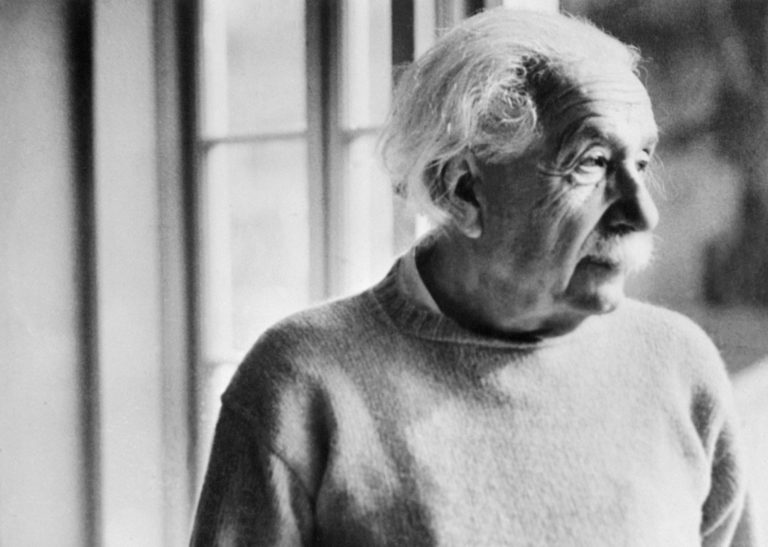S. James Gates
Einstein Speaks to Us About Race
“His capability to ask the ‘What if?’ question opened the door to the deepest marker of humanity, and that’s empathy.” Physicist S. James Gates celebrates the scientific and social power of Albert Einstein’s imagination.

Image by AFP/Getty Images.
Guest

S. James Gates Jr. is Toll Professor of Physics and Director of the Center for String and Particle Theory at the University of Maryland in College Park. He serves on President Obama's Council of Advisors on Science and Technology.
Transcript
Krista Tippett, host: The Einstein we celebrate is a towering figure in science. But Albert Einstein also had a rich and complex passion for racial healing. This was catalyzed during his time in the U.S., when he witnessed injustice toward African Americans that contradicted the American commitment to liberty and human equality that so drew him. “The more I feel an American,” he wrote in a still-trenchant 1946 essay called “The Negro Question,” “the more this situation pains me. I can escape the feeling of complicity in it only by speaking out.”
Even before he fled Nazi Germany and settled for the rest of his career at Princeton, Einstein had a lively and supportive correspondence with American black leaders and organizers, including W.E.B. Du Bois. He joined his name to an international campaign to save the Scottsboro Boys. He founded an anti-lynching initiative with Paul Robeson. And when the renowned opera singer Marion Robinson came to sing in Princeton, that township’s deep segregation barred her from staying in the best hotels, and so Einstein invited her to stay in his home.
[music: “Sun Will Set” by Zoë Keating]
This is Becoming Wise — an inquiry into the mystery and art of living. I’m Krista Tippett.
S. James Gates is a successor to Einstein’s social and scientific legacy. He’s a string theorist and the first African American to hold an endowed chair in physics at a major American research university. And he traces Einstein’s racial sensibility to a sense of empathy manifest even in his approach to science.
S. James Gates: Essentially, whenever his great moments of insight occurred, he cast them in the form of parables. So, for example, the great breakthrough of special relativity, which occurred in 1905, if you listen to him, he’ll tell you that it all began with him wondering what the world would look like if he could ride along on a beam of light. That’s a story. That’s a parable. Here’s someone who looks at the world, asks very simple questions about the world, and recognizes in asking the questions that they contain an essentially deep and fundamental fact, one which, curiously enough, when he asks, he does not understand. But he knows the question is right.
Ms. Tippett: Is there kind of an ethic that is reflected in that science?
Mr. Gates: As I’ve experienced my profession, which is obviously the one in which he achieved so very much, I’ve been struck by the fact that, in many ways, being a theoretical physicist is being like a composer of music. In fact, I think there’s only one essential difference between the two: namely that for musical composers, one’s ability is judged by the nature of the audience, whereas in theoretical physics, it’s the audience o nature that provides the judgment. So if there’s an ethic, it’s an ethic that involves human creativity. It’s an ethic with an absolute commitment to removing falsehoods from our system of belief.
Ms. Tippett: I’d like to talk to you about Einstein and race. This was a huge concern of his. And you grew up, in my understanding, in a racially segregated world. It was the ’50s and ’60s, but it was Orlando, Florida, and it was what he saw and was shocked by once he came into this country that he, having left Nazi Germany, considered to be a place of tolerance and equality of all people. Is this something that you’ve always known about Einstein? How did you learn about it?
Mr. Gates: No, it’s not. It’s certainly not. I learned about Einstein’s comments on race in the early ’90s. A friend of mine who’s also an African-American physicist, he said, “Do you know what Einstein said about race?” And I said, “No.” And then he directed me to a book called Out of My Later Years. And in the book there is a short essay. I have it here with me. If you don’t mind, I can read some of it.
Ms. Tippett: No, do, please.
Mr. Gates: Einstein says, “In the United States, everyone feels assured of his worth as an individual. No one humbles himself before another person or class. Even the great differences in wealth, the superior power of a few, cannot undermine this healthy self-confidence and natural respect for the dignity of one’s fellow man. There is, however, a somber point in the social outlook of Americans. Their sense of equality and human dignity is mainly limited to men of white skins.” And then he goes on to say, “The more I feel American, the more this situation pains me. I can escape a feeling of complicity only by speaking out. Many a sincere person will answer me, ‘Our attitude towards Negroes is the result of unfavorable experiences which we have had living side-by-side with Negroes in this country. They are not our equals in intelligence, sense of responsibility, or reliability.” Einstein answers, “I am firmly convinced that whoever believes this suffers from a fatal misconception. Your ancestors dragged these black people from their homes by force, and in the white man’s quest for wealth and an easy life, they were ruthlessly suppressed and exploited, dragged into slavery.”
When I first came across these quotes, I was thunderstruck, to be quite frank with you. I could not have imagined that, A, Einstein would have made such quotes, but we know he did, and we know he attached great importance to them, because in a book of what he considered his most important essays, this essay is included. So we know he thought a lot about this. But after I accepted that he actually said such things, the next puzzle for me was, why? Because prior to Martin Luther King, I don’t know of any other Nobel laureate who spoke so forcefully for the rights of African Americans.
Ms. Tippett: Right; and here is this German Jewish super-genius physicist who’s working out gravity. I know.
Mr. Gates: So here’s this German Jewish guy… Right. So how in the world does he get there? This is something that puzzled me and has puzzled me for a long time, but you’ll remember earlier in our conversation, I talked about Einstein as an exceptional scientist working in an exceptional way. And I concentrated on the fact that when he had these fundamental instances of insight, he cast them in the language of parables. So he asked the question, “What if?” When you think of this as sort of the mode in which Einstein explores science, to me it is not such a great leap for him to have asked the question, “What if I was a person of African heritage?” And because he had the capability to ask the “What if?” question, it opened the door to what I think is, perhaps, the deepest marker of humanity, and that’s empathy. That allows me to understand how he got there. I’ve been thinking about this for about a decade or so. This is the only thing that makes sense to me so far.
Ms. Tippett: It’s these scientific virtues of curiosity and creativity transposed to the social sphere, I guess.
Mr. Gates: Yes. And after I thought about it, it should not have been a surprise to me that, in some sense, there’s a consistent view of what the mind of Albert Einstein is doing, whether you look at his science or whether you look at his pronunciations in the larger domain of human societies.
Ms. Tippett: And we can also guess that because he lived as a Jewish scientist as Nazism approached, he had this experience of being a minority, a persecuted minority.
Mr. Gates: He was certainly primed to recognize oppression in whatever guise he encountered it. We all know of him as a great scientist, but there’s this very famous quote he made about his scientific work, and someone asked him if it were proven right or wrong, what would it mean. And he said something like, “If I’m right, the Germans will proclaim me a German, and the French will proclaim me a citizen of the world. But if I am wrong, the French will say I’m a German, and the Germans will say I’m a Jew.” So it’s clear that his experiences before coming to the U.S. primed him to be very sensitive to matters of discrimination and our species’ capability of treating each other in such inhumane ways.
I count myself, in some sense, doubly fortunate, because I get to be an inheritor not just of his scientific accomplishment, but I also get to be an inheritor in a very special way with regard to his concern for the unity of mankind. And that’s something that most of my colleagues don’t share, so it’s something that is a very great source of joy in my life.
Ms. Tippett: S. James Gates is the John S. Toll Professor of Physics at the University of Maryland. He received a National Medal of Science in 2013. You can find Einstein’s essay “The Negro Question” at onbeing.org.






Reflections